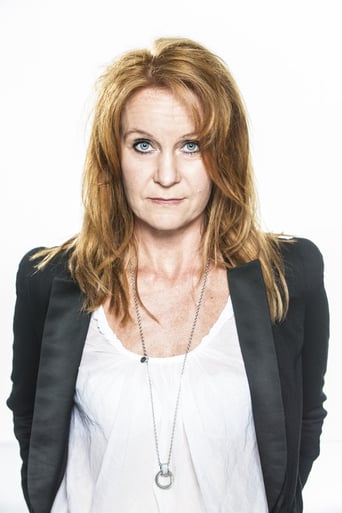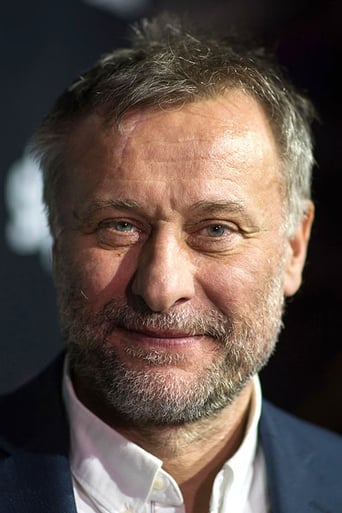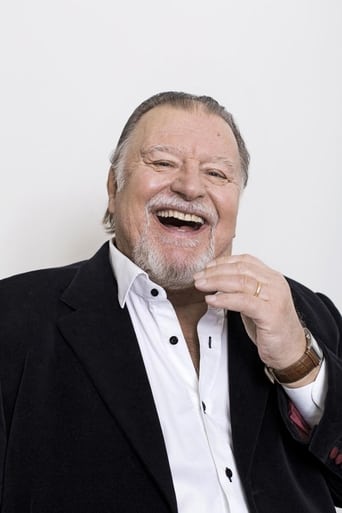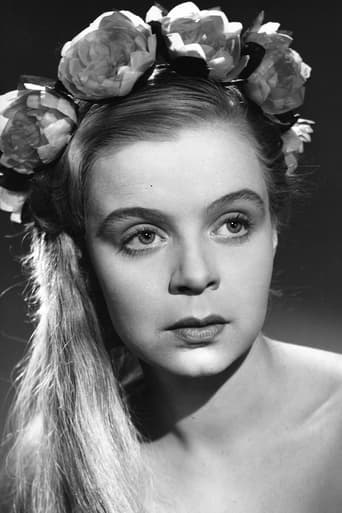AniInterview
Sorry, this movie sucks
Console
best movie i've ever seen.
Zandra
The movie turns out to be a little better than the average. Starting from a romantic formula often seen in the cinema, it ends in the most predictable (and somewhat bland) way.
Erik Olson
The film Mother of Mine was a very emotional film about a young boy named Eero who is forced to leave Finland and travel to Sweden where he lives with a foster family until the war was over. This film incorporated a common Nordic film theme of a love triangle, however, this time it was between two mothers and Eero. Personally, I thought the director, Klaus Haro, did an amazing job of utilizing certain filming techniques in order to make some of the heartbreaking scenes feel much more dramatic. I also thought that the plot was excellent and kept the viewer guessing as to what Eero would have in store for him in every coming day.This movie takes place during World War II where thousands of Finnish children were evacuated from Finland to Sweden in attempt to avoid the bombing and raids. Kirsti and Eero have to deal with the unfortunate news of her husband and his father dying in battle, which Kirsti does not cope with all too well. Kirsti then decides that after losing her husband that she could not deal with losing her son as well so she decides to send him off to a foster family in Finland. After finally arriving at his foster home in Sweden, he is not accepted right away at all by Signe due to the fact that she was expecting a young girl. Throughout the movie, we begin to see emotional connections being made between Eero and Hjalmar, Signe's husband, which leads to the eventual bonding between Signe and Eero as well. As the movie progresses, Signe begins to accept Eero as one of her own and even refers to him as her child. This occurs right after Signe reveals to Eero that she had a 6 year old daughter who drowned to death two years prior to him coming to their house. As viewers we now watch a strong relationship develop between the Jonsson's and Eero, which makes us become emotional as we anticipate a letter coming in the mail from Kirsti requesting the return of Eero back to Finland. In the end, Eero is forced to leave the Jonsson's and travel back to Sweden and meet up with his mother, which was very painful for Eero as he had developed a strong relationship with the Jonsson's. The final scene of the movie ends with Eero as an adult who visits the grave of Signe because he never had the guts to leave Kirsti again and see Signe of whom he loved so much.As a viewer, I found this film to be very emotional and frustrating to watch because Eero never really had a chance to settle down and find his true family. Its one thing to have to leave your own country and travel to another of which you cant speak the language, but to have to leave your mom behind, or in this case your last family member, would make the experience much more difficult. On top of that he then had to learn Swedish and cope with a foster mother who at the beginning of their relationship was extremely bitter and harsh towards him. Once he began to get to know the family, he then had to try and fit in at school and learn how to help out at the farm, all while receiving letters from his mother saying that it would be longer until he could come back. What made me cry is when he found out his mom left him for a German soldier, which led him to become fully attached to the Jonsson family, which ended up hurting him as he received a letter later on saying that his mom separated from the soldier and demanded he be sent back to Finland. Between the confusion and unsettledness of Eero, we the viewers become very sad for Eero as we watched his heart being broken several times throughout the movie.As far as how the movie was shot, I felt that the slow motion scenes when Eero originally leaves Kirsti and then again when he has to leave the Jonsson residence makes the viewer much more emotional as we realize that Eero is yet again being torn from loved ones. I really felt a part of the scene when Signe could not watch Eero be dragged into the car and then she chased him down the road. I thought the acting was phenomenal in that scene and I really began to feel for not only Eero but the Jonsson family as well. Another technique I noticed throughout the movie was the sharpness of the sound. I could here when the cast gulped and many other subtle noises throughout the movie could be heard crystal clear. This made me feel like I was actually watching the film live and helped me become much more attached to the characters as well.In conclusion, I thought that the film was a 9-10 stars and I would without a doubt recommend it to anyone interested in watching a foreign film. As I mentioned before, I thought the plot was very well thought out and made the viewers feel extremely connected to the characters, of who all acted wonderfully throughout the entire film. All in all, I would not mind watching this film for a second or third time in the future and am very happy that I had the opportunity to view it.
yossarian100
Klaus Härö has done two films that I've seen, MOTHER OF MINE and ELINA, which are two of my all time favorite movies, and the only other director who has done that is Akira Kurosawa.Few directors are able to show us the unimaginable sense of loss children can sometimes feel the way Klaus Härö can, and do it in such a compelling, honest, and beautiful way.Utilizing great camera work, a stunningly talented group of actors, and a rock solid screenplay, he goes about painting a portrait so real it broke my heart.Almost anyone can put together a list of 'must see' movies, but, as far as I'm concerned, MOTHER OF MINE and ELINA should appear on a 'movies to see before you die' list. They are both THAT good.This is film-making at its finest!!!
Chad Shiira
A mother and her young son emerge from their house for the last time as a family made temporary by an interrupting war. The thin trunks of topless trees can't camouflage the old man in black whose convergence with the woman and the boy is halted by the next anxious moment. The bible should be a dead giveaway to this apprehensive encounter, but the priest removes his hat before he gets any closer, just so there's no confusion about the meaning of their meeting. Before long, Eero(Topi Majaniemi) and his mother(Marjaana Maijala) are told by some grim women that they'll have to separate. And so it is, the church's will, that Eero finds himself on a crowded boat with other fatherless Finnish children, en route to Sweden where he'll live with a Swedish family until the war is over."Aideista parhain" is about the unexamined feelings between Eero and his mother Kirsti during the period of their severed existences, in which both parties are forced to revisit when the former "war child" returns to Sweden for the funeral of his foster mother, breaking the complicit silence they maintained throughout the intervening decades. Told in flashback, this black and white film switches to color, as if the past is more vivid to Eero than the present.By boat, by train, and then by bus, the boy whose father was killed by Russians, meets his new guardians on an unpaved road; Hjalma(Michael Nyqvist) and Signe(Maria Lundqvist) Jonsson, one of many Swedish couples who provided shelter and sustenance to over seventy-thousand Finnish children affected by the war. While the farmer seems accommodating enough, Signe is hostile and sometimes downright odious towards Eero from the outset, walking ahead of her husband and charge with a head full of steam, back to their house on a farm. Since we recognize that "Aideista parhain" aspires to be an epic cut from the same cloth as American epics about life during wartime, we're not fooled by Signe's distaste for the "strange" Finnish boy with his strange Finnish ways. Panorama after panorama of sumptuous Swedish scenery makes it clear that "Aideista parhain" is governed by the same parameters as a mainstream studio movie from Hollywood. Signe may shout, or even hit Eero, but she's not going to stab him with a kitchen knife, nor will the boy, like a boy from some Patrick McCabe adaptation. The movie's soundtrack is so sentimental, so heavily laden with strings to overemphasize every moment of incident with its crescending bulge, it takes away the possibility of the unexpected, because "Aideista parhain" is essentially a European version of a prestige film meant to secure multiple Oscar nominations.But when Signe's moment of transformation arrives, the emergence of the nurturing mother beneath that gruff exterior we predicted all along seems entirely arbitrary, as is her epiphany about Eero's sudden lovability. In the last scene, Signe chastises the boy for stealing money and running away. She calls social services to send the boy back home. But when the administrative woman suggests that Eero would be sent to a children's home, Signe has a change of heart, but the audience will be hard-pressed to allocate that change of heart's origin. Thin air, that's where she got it. His impending departure should be cause for celebration after her constant ill-mannered behavior towards the boy. There's not enough smoke and mirror-magic from the screenplay to obscure the paradigm.After "Aideista parhain" is through with casting Signe as the villain, we learn that Eero's mother abandoned him in favor of a German soldier. The film would be riveting if we, along with Eero, had a harder time deciding between both mothers when it's time for his return to Finland. "Aideista parhain" decides for us. Of course, we're more sympathetic towards Signe's claim, after all, his birth mother is f****** a soldier affiliated with the Nazi party. While Eero functions as a replacement for Signe's dead little girl(who drowned under her care), the mother uses her son as a preventive measure against a heartbreak of the romantic sort(or so it seems)."Aideista Parhain" gets even more manipulative after the old man learns belatedly about his mother's intentions in a letter written by Signe. It's a far-fetched notion that Eero never broached the subject with Kirsti in all those years, because if he felt like a consolation prize to a German, logic dictates that he'd return to Sweden and seek the real love of a devoted mother. "Aideista Parhain" is unmistakably misogynistic; it gets off on reducing an old woman to tears, then tries to have it both ways by redeeming her. But it's too late. The audience will feel jerked around after investing our allegiance with Signe."Aideista parhain" casts Signe and Kirsti as the mother and the whore, then lacks the conviction to let the sow be a sow.
researchingmedia
Haven't been so totally blown away by a movie for quite a while - it's rare in Hong Kong that all the 5 audience in the cinema all ended up soaking in tears - if that didn't tell you enough about the movie..There were movies, like the Dutch movie Simon, that tried to capture the subtle dynamics among fathers and sons, or the Canadian one, Barbarian Invasion. This movie, however, has yet overrode those movies by its subtle but yet delicately constructed interplay among father, mother and the son. More so it touched so much upon young man's hope and tie with the mother. Just when you think that was the whole thing about the movie (i.e. mother and son, anti-war wake-up call), the movie got brilliantly galvanized by the two women in how they dealt with themselves and the motherhood, and what they wanted, adding a potent twist to the narrative as well as gently tweaking the emotions of the audience.For such a long time there was no movies that was able to employ such a basic and simple setting but yet so able to capture the multi-faceted humanities in such an embedded, compiling way.Highly recommend this movie.




